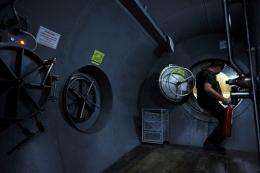A participant volunteer moves inside the Mars 500 capsule in the outskirts of Moscow in April 2010. The six men who enlisted to be locked up for over 500 days to simulate a mission to Mars called themselves "trailblazers" Tuesday, saying they were ready to face the strain of the isolation.
The six men who enlisted to be locked up for over 500 days to simulate a mission to Mars called themselves "trailblazers" Tuesday, saying they were ready to face the strain of the isolation.
"We are trailblazers, but while this is very exciting, it brings a certain responsibility. I echo my teammates in saying we will do everything to be successful," Russian volunteer Mikhail Sinelnikov told reporters in Moscow.
The three Russians, two Europeans and one Chinese national will be sealed away for one-and-a-half years inside a 180-square-metre (1,000-square-feet) spaceship module on the outskirts of Moscow starting on June 3.
"It will be trying for all of us. We cannot see our family, we cannot see our friends, but I think it is all a glorious time in our lives," enthused Chinese participant Wang Yue, who is the youngest volunteer at age 27.
The mission will set the stage for "future generations who will actually travel frequently to Mars," said Italian-Colombian participant Diego Urbina.
The ambitious project, the first full-duration simulated flight to Mars, aims to test one of the biggest unknowns of an eventual manned mission to Mars: the psychological and physical toll on humans.
The idea is to exactly reproduce the timescale of a Mars mission -- 250 days for the trip to Mars, 30 days on the surface and 240 days for the return journey, totalling 520 days, cut off from the world in a mock spaceship.
To make things as real as possible, designers went into minute details. Frenchman Romain Charles, 31, said what most surprised him were the sheer number of neatly piled space suits on board the module.
"We don't wash them. When the clothes are dirty we throw them out -- out to outer space," he said laughing, adding the crew would only get to shower once every ten days.
The Mars-500 team's contact with the outside will also be delayed and often disrupted to mimic a real situation, preventing chats with friends and family and leaving the crew to fend for themselves in a crisis.
To stave off the blues and break up daily routines, the crewmen can only count on each other, Charles told AFP.
"It will be tough. A year and half is not a small thing. It is a very long time, but we are building a team for each other to help the one who is down," he said.
Yue said he was also instructing teammates in the Asian martial art of Tai Chi to help them overcome the physical and mental stress of confinement.
The Mars-500 mission follows a similar experiment at the Russian Institute for Biomedical Problems (IBMP) last year which saw six volunteers shut away in the module for a shorter period of 105 days.
It is a joint venture of the IBMP and the European Space Agency (ESA), which describes the project as an attempt "to mimic a full mission to Mars and back as accurately as possible without actually going there."
The mission cannot hope to stimulate all aspects of a space mission, such as micro-gravity and exposure to ionizing radiation, project director Boris Morukov admitted.
But the crew will experience weightlessness, which can have a debilitating effect long term, deteriorating muscle and bone tissue -- a physical toll to be faced by the crew when they leave the training module.
A real flight to Mars will not set off before 2030, in the opinion of the head of ESA's mission to Russia Rene Pischel.
"But a mission to Mars is not so much of a technical problem today. The biggest technical challenge is the money," Pischel told AFP.
"To put a big pile of money on the table you need a real good reason, and that is one of the reasons that this project is so important in convincing people that it could happen safely," he said.
(c) 2010 AFP























